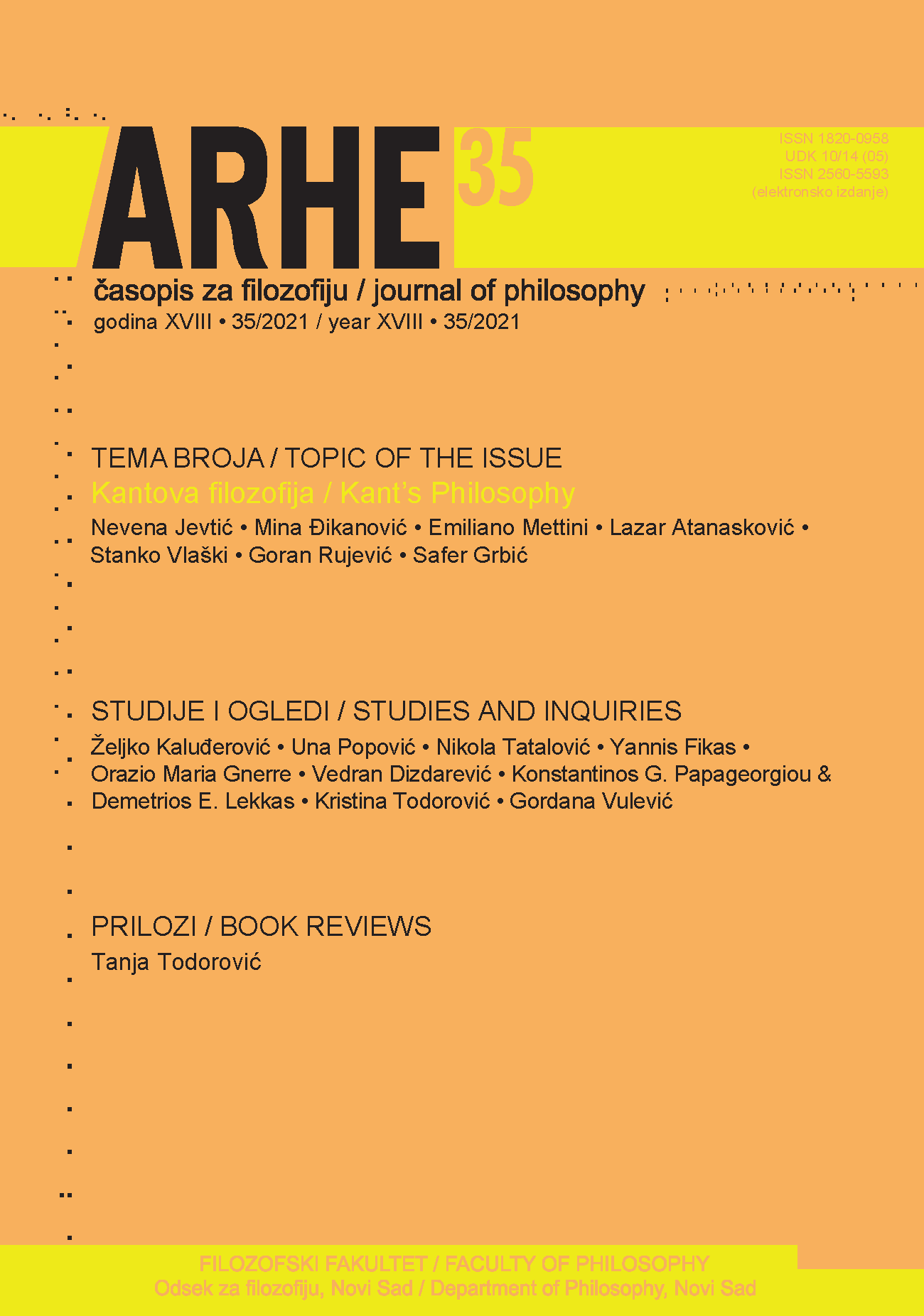KANT’S CONCEPT OF ALTERATION
Main Article Content
Abstract
The article demonstrates that the meaning of the revolution which has happened in philosophy with Kant’s critical philosophy can be interpreted by the inquiry concerning Kant’s very concept of alteration [Veränderung]. The author thematizes Kant’s observation that the understanding alone cannot grasp the possibility of the alteration as related to some of the fundamental insights of the Western metaphysics, precisely with the Eleatic negation of the thoughtfulness of the alteration and the moving, viz. with the Eleatic negation of the reality of kinēsis as such. The author tries to show that Kant’s integration of the concept of alteration within the system of transcendental knowledge of the subjectivity one should interpret in the light of his efforts to reveal conditions of synthetic a priori knowledge. Alteration shows itself for the lively cooperation of understanding and sensibility, concept and intuition, and as this cooperation as such. In the final chapter, Kant’s thesis that the alteration is possible due to a priori character of time – thesis by which one also accepts that everything that belongs to the future is necessary determined by the past, and therefore necessary validity of the law of causality – is interpreted as the key for the understanding of the reasons why Kant rejects possibility of the recognition of the absolute value of alteration. For Kant, one should not absolutize such deterministic concept of alteration, for the good of moral freedom as the sphere where human finds its true dignity. Therefore, this sphere from the Kantian standpoint has to transcend every discussion concerning the alteration.
Article Details
References
Aristotel, Fizika, Paideia, Beograd 2006., prev. S. Blagojević.
Aristotel, Kategorije, u: Analitika I-II. Kategorije. O izrazu, Paideia, Beograd 2008., prevod i komentari S. Blagojević, str. 3-74.
Blomme, H., „Kant’s Conception of Chemistry in the Danziger Physik”, in: Clewis, R. R. (ed.), Reading Kant’s Lectures, De Gruyter, Berlin 2015, str. 498; dostupno na: https://lirias.kuleuven.be/retrieve/530993 (pristupljeno: 20.2.2021.) DOI: https://doi.org/10.1515/9783110345339-038
Bošnjak, B., Logos i dijalektika, Naprijed, Zagreb 1961.
Cramer, K., „Non-pure Synthetic A Priori Judgments in the Critique of Pure Reason“, in: Beck, L. W. (ed.), Proceedings of the Third International Kant Congress (Held at the University of Rochester, March 10—April 4, 1970), D. Reidel Publishing Company, Dordrecht-Holland 1972, str. 246-254. DOI: https://doi.org/10.1007/978-94-010-3099-1_18
Falkenstein, L., „Kant, Mendelssohn, Lambert, and the Subjectivity of Time“, in: Journal of the History of Philosophy, Vol. 29, No. 2, April 1991, str. 227-251. DOI: https://doi.org/10.1353/hph.1991.0046
Hegel, G. V. F., Istorija filozofije I, BIGZ, Beograd 1975., prev. N. M. Popović.
Hegel, G. V. F., Nauka logike, Prosveta, Beograd 1973., prev. D. Nedeljković.
Kangrga, M., Praksa, vrijeme, svijet, Nolit, Beograd 1984.
Kant, I., Kritika čistoga uma, Dereta, Beograd 2003., prev. N. Popović.
Kant, I., Kritik der reinen Vernunft, Suhrkamp Taschenbuch Verlag, Frankfurt am Mein 1974.
Kant, I., Lectures on logic, Cambridge University Press, Cambridge 1992., transl. and ed. by J. M. Young. DOI: https://doi.org/10.1017/CBO9780511810039
Kant, I., Prolegomena za svaku buduću metafiziku, Plato, Beograd 2005., prev. B. Zec.
Kant, I., On the form and principles of the sensible and the intelligible world [inaugural dissertation], in: Theoretical philosophy, 1755—1770, Cambridge University Press, Cambridge 1992, translated and edited by D. Walford in collaboration with R. Meerbote, str. 373-416.
Kant, I., Metafizička polazna načela prirodne znanosti, u: Metafizika prirode, Akademska knjiga, Novi Sad 2016., prev. M. Soklić, str. 219-319.
Kant, I., Notes and Fragments, Cambridge University Press, Cambridge 2005, ed. by P. Guyer, transl. by C. Bowman, P. Guyer, F. Rauscher. DOI: https://doi.org/10.1017/CBO9780511498756
[Kant, I.] Immanuel Kant's vermischte Schriften und Briefwechsel, hg. von J. H. V. Kirchmann, L. Heimann's Verlag, Berlin 1873.
Kant, I., Kritika praktičkog uma, Plato, Beograd 2004., prev. D. Basta.
Kasirer, E., Kant. Život i učenje, Hinaki, Beograd 2006., prev. A. Buha.
Laertije, D., Životi i mišljenja istaknutih filozofa, Dereta, Beograd 2003., prev. A. Vilhar.
Lejewski, Cz., „Antička logika“, u: Prior, A. N. (ur.), Historija logike, Naprijed, Zagreb 1970., prev. B. Petrović, str. 9-30.
Pejović, D., „Bitak i kretanje. Fizika i metafizika u mišljenju Aristotela“, u: Aristotel, Fizika, Globus—Liber, Zagreb 1988., prev. T. Ladan, str. V-XXXI.
Perović, M. A., „Epohalni smisao Kantove filozofije”, u: Arhe 1/2004., str. 7-21.
Ritter, J./Gründer, K./Gabriel, G. (Hg.), Historisches Wörterbuch der Philosophie XII, Schvabe Verlag, Basel 1971-2007.
Roveli, K., Poredak vremena, Laguna, Beograd 2019., prev. G. Skrobonja.
Smith, N. K., A Commentary to Kant's Critique of Pure Reason, Palgrave Macmillan, Hampshire—New York 2003. DOI: https://doi.org/10.1057/9780230595965
Vaihinger, H., Kommentar zu Kants Kritik der reinen Vernunft I-II, Union deutsche Verlagsgesellschaft, Stuttgart/Berlin/Leipzig 1922.
Vlaški, S., „Parmenidovo prešućeno bogoslužje“, u: Filozofska istraživanja 141 (1/2016), str. 51-63. DOI: https://doi.org/10.21464/fi36105
Žunjić, S. (prir.), Fragmenti elejaca: Parmenid – Zenon – Melis, BIGZ, Beograd 1984.
